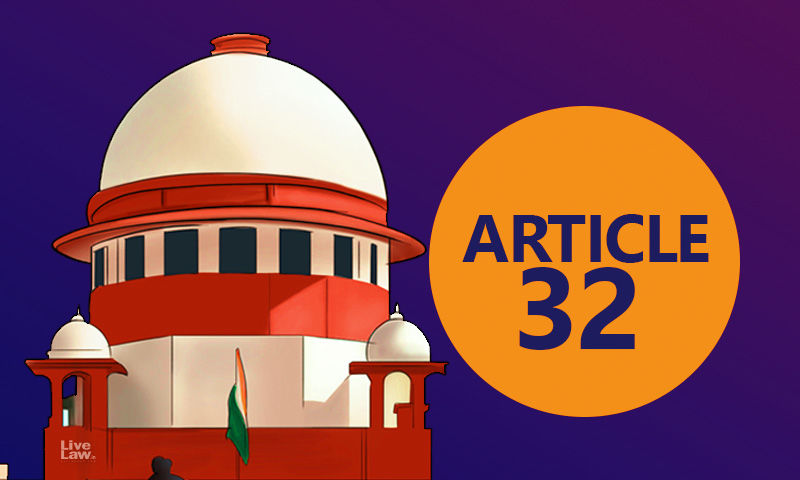Latest News
The Significance and Scope of Article 32 of the Indian Constitution:

Introduction:
Article 32 of the Indian Constitution is considered one the most important articles when it comes to the enforcement of the rights of an individual. It gives rights to an individual to seek justice in a court when they feel that their rights have been infringed or ‘unduly deprived’. The supreme court has the power to execute the rights that have been bestowed upon an individual by the constitution.
Under Article 32, parliament can also entrust the exercise of the authority of the Supreme Court to any other tribunal, providing that it is within its jurisdiction. And until there is a constitutional amendment, it is not possible to suspend the protections secured by this article. Therefore, from this article, we may conclude that an assured right is guaranteed to persons for the protection of fundamental rights as the statute grants a person the right to immediately reach the Supreme Court without pursuing a longer procedure by going to the lower courts first as the primary object of Writ Jurisdiction under Article 32 is to enforce fundamental rights.
The article contains other constitutional rights in Part III of the Constitution, including democracy, freedom of speech and expression, life and personal liberty, and freedom of religion. Only if any of these fundamental rights are violated can an individual, under Article 32, directly approach the Supreme Court.
Dr. B.R. Ambedkar has said, “If I was asked to name any particular article in this Constitution as the most important — an article without which this Constitution would be a nullity — I could not refer to any other article except this one (Article 32). It is the very soul of the Constitution and the very heart of it”.
Writs under article 32:
The high court and the supreme court can be approached in case of violation of fundamental rights. There are five types of writs that can be issued in case of violation of fundamental rights, they are:
1) Habeas Corpus: This means that ‘produce the body’, the main purpose of this writ is to claim against the unlawful detention of an individual. The purpose of it is to protect an individual from unlawful harm caused by the administrative system
2) Quo Warranto: It means ‘By what means’. This writ shall be invoked in public service cases and shall be given to preclude people to whom he is not entitled from participating in public office.
3) Mandamus: It literally means ‘We Command’. This writ is provided for the proper execution of compulsory and exclusively ministerial duties and is issued to a lower court or government official by a superior court.
4) Certiorari: It literally means to be certified. It is provided where the power is wrongfully exercised and the judgment of the case is focused on it.
5) Prohibition: That is a writ that orders a lower court to avoid doing anything that the statute forbids it to do. The primary aim is to prohibit an inferior court from violating its authority or behaving in violation of the provisions of Natural Justice.
Scope of Article 32:
The scope of Article 32 has been established by case laws over a period of time. A bench of seven judges had unambiguously declared, in the case of L.Chandra Kumar v Union Of India and Others, that Article 32 was an intrinsic and necessary function of the Constitution and constituted its fundamental structure. Likewise, in a decision In the case of S.P.Sampath Kumar v. Union Of India, it was found that the powers of the Supreme Court under Article 32 formed part of the constitutional framework of the Constitution. In the ADM Jabalpur vs Shivakant Shukla case, a five-judge bench of the Supreme Court ruled during the 1975 Emergency that the right to constitutional redress pursuant to Article 32 must remain suspended during a national emergency. Citizens were powerless to obtain redress to their human rights compliance. More recently The Supreme Court of India bench, led by the Chief Justice of India S A Bobde, acknowledged that under Article 32 of the Constitution it is "trying to discourage" persons from filing petitions. The observation came at the hearing of a petition demanding the release of journalist Siddique Kappan, who, on his way to Hathras, Uttar Pradesh, was arrested along with three others to report on an alleged gangrape and murder.
1) Alankrita Singh, (2018). “Article 32 under the constitution of India-right to constitutional remedies”, iPleaders, 24 July Available at: https://blog.ipleaders.in/article-32-constitution-india/
2) Revati Krishnan, (2020). “What is article which Ambedkar was ’heart’ and ‘soul’ of constitution”, The Print, 17 November Available at: https://theprint.in/theprint-essential/what-is-article-32-which-ambedkar-said-was-heart-and-soul-of-constitution/546050/



































































































